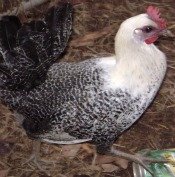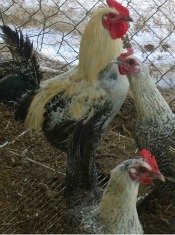Fayoumi: The Ancient Egyptian Breed
The Fayoumi chicken breed has a good disease resistance quality and is a good producer of small eggs.
Fayoumi Facts:
Size: Standard Male: 4.5 Ibs. / Standard Female: 3.5 Ibs.
Comb, Wattles & Earlobes: They have moderately large single combs with six upright points and medium size wattles and earlobes. All are bright red though the earlobes have a white spot.

Color: They have a dark horn to slate blue beak and dark brown eyes with slate shanks and toes. Male: The head, neck, back, and saddle are silvery white. The breast, body, and legs are barred in black and silvery white. The tail and wings are black with white highlights. Female: The head and neck are silvery white and the rest of the plumage is barred in black and silvery white.
Place of Origin: Egypt
Conservation Status: Study
Special Qualities: They have a good disease resistance and are good egg producers.
This small, active bird has been around in Egypt since the time of the pharaohs. These birds are not common among breeders and very hard to find.
Iowa State University has played a big part in their preservation and study and has maintained a flock since the early 1940's, when the dean of agriculture carried some hatching eggs home from Egypt for the poultry genetics program to study.
The breed has been a most interesting one to study as well. Scientists at Iowa State have found that the breed has an excellent resistance to a number of viral and bacterial infections, possibly including avian influenza.
This makes a very interesting breed when you consider the potential for pandemic outbreaks in birds.
The breed has a tail that sticks out and up at an angle and they have a forward tilt that tends to remind you of a roadrunner.
Young hens do not tend to be broody, but they become more broody as they get to be two or three years old. They are excellent layers of small off-white eggs. Sometimes their eggs tend to be pink-tinted.
Return from Fayoumi to Poultry Breeds

Custom Search




New! Comments
Have your say about what you just read! Leave me a comment in the box below.